Amnesty International Exposes Destruction of Protesters' Graves
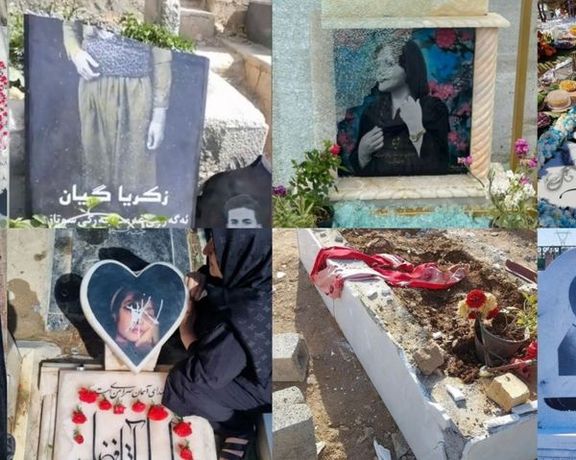
Amnesty International has revealed that the graves of protesters killed during last year’s protests have been vandalized and their families harassed.

Amnesty International has revealed that the graves of protesters killed during last year’s protests have been vandalized and their families harassed.
The human rights organization's latest research, published Monday, provides concrete evidence of the Iranian authorities' efforts to silence those seeking justice for their loved ones.
The report reveals that graves belonging to more than 20 victims from 17 cities have been vandalized. Graves have been damaged with tar or paint and in some cases set on fire, headstones have been shattered, and inscriptions describing victims as “martyrs” or stating that they died for the cause of freedom have been scraped away. The authorities have also tried to stop victims’ families from holding ceremonies at the graves of their loved ones.
There have not been any official investigations into these acts and in the report, Amnesty International demands immediate action.
"Amnesty International calls on all states to exercise universal jurisdiction and issue arrest warrants for Iranian officials, including those with command responsibility, who are reasonably suspected of criminal responsibility for crimes under international law committed during and in the aftermath of the uprising," urged Diana Eltahawy, Amnesty International’s Deputy Regional Director for the Middle East and North Africa.
Mahsa Amini's family has also faced repeated damage to her grave. The Iranian authorities have announced plans to alter Aichi cemetery in Saqqez, Kurdistan province, where she is buried, limiting public access.
The human rights organization emphasized the international community's responsibility towards protecting the rights of victims' families. These families are subject to arbitrary arrests, unjust prosecutions, coercive interrogations, and unlawful surveillance. The organization demands that the Iranian authorities respect their right to freedom of expression, assembly, and association.
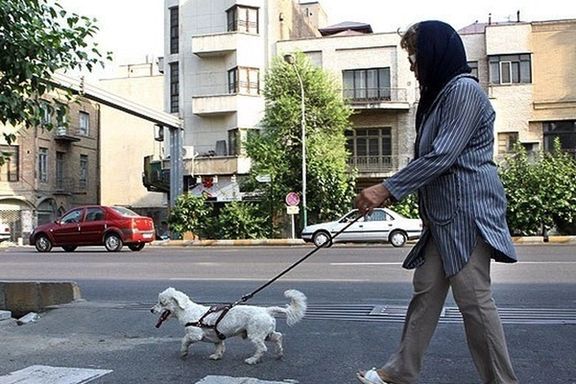
A real estate agency is sealed off and its owner arrested in Iran after a video went viral of the property agency transferring the ownership of an apartment to a dog.
The footage showed an Iranian couple signing a contract transferring the title of their apartment to their small furry white dog Chester.
In the video, which seems like a practical joke, the agent is shown describing the property while Chester's owner places his pawprint on the deed.
Iran’s police issued a statement on Sunday announcing the arrest and the shutdown of the agency, with Tehran’s deputy prosecutor Reza Tabar mentioning “issuing an invalid contract for an apartment unit” as the reason behind the arrest. He added that “this action is illegal and was meant to demean the norms of society.”
The Islamic Republic regime views keeping dogs as a symbol of Westernization that can be dangerous and should be prohibited. Dogs are generally considered 'impure' in Islam and banned in public places by some majority-Muslim countries including Saudi Arabia. Iranian parliamentarians in November proposed a bill banning selling and keeping of pets.
Lawmakers backing the measure claimed the ban was meant to protect public health. While working dogs have always been common in Iran’s rural areas and on farms, keeping pets has only recently become fashionable in urban areas despite occasional police crackdowns.
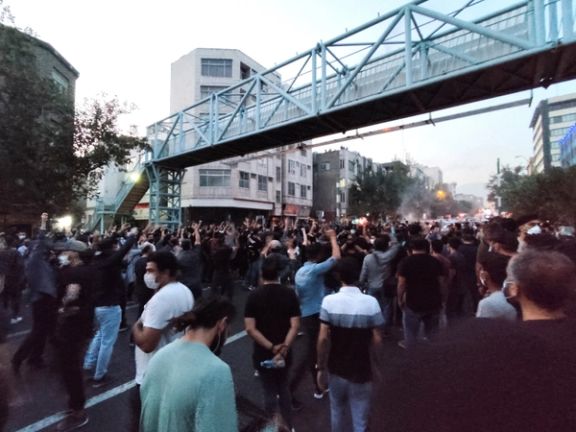
Human Rights Watch has reported mass arrests of Iranian women’s rights defenders by the regime ahead of the anniversary of Women, Life, Liberty protests.
The New York-based rights watchdog said Saturday that regime authorities have arrested at least a dozen activists and intensified pressure on a wide range of peaceful dissidents ahead of the anniversary of the nationwide rallies that swept the country beginning in Spetember 2022, following the death of Mahsa Amini in police custody.
The uprising -- dubbed the Women, Life, Liberty movement -- has been the boldest challenge against the clerical autocracy since its establishment in 1979. The regime brutally cracked down on the antigovernment protests, killing more than 500 people and arresting over 22,000 others.
“Iranian authorities are using their go-to playbook of putting maximum pressure on peaceful dissidents ahead of the anniversary,” said Tara Sepehri-Far, senior Iran researcher at Human Rights Watch. “The arbitrary arrests of a dozen activists are aimed at suppressing popular discontent with ongoing impunity and rights violations.”
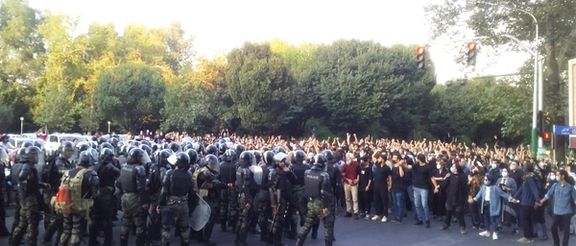
In recent weeks, the Islamic Republic regime has intensified its intimidation campaign to discourage potential unrest, detaining civil and human rights activists and students as well as harassing families of protesters who died during the crackdown, with reports coming from several provinces, including Tehran, Gilan, Kordestan, West Azarbaijan, and Esfahan (Isfahan).
At least 12 people were arrested in Gilan province this week, including five women's rights advocates, a photographer, a poet, a graphic designer, and three pharmacists. The General Intelligence Office of the province issued a statement saying it had arrested a network of 12 people “who were planning to disrupt security” and were participating in trainings aimed at a “soft overthrow” of the regime, without providing any evidence. Hengaw Human Rights Organization, a Kurdish rights group, said Thursday that at least 15 people have been arrested in Kurdish majority cities in the past few days.
The intelligence ministry and the Revolutionary Guard (IRGC) intelligence organization (SAS) have been reaching out to individuals who were arrested during the anti-regime protests. They are warning them not to participate in any demonstrations on the anniversary of the protest movement, according to sources in Iran who spoke to Iran International.
On Thursday, August 17, Supreme Leader Ali Khamenei held a meeting with a large group of Revolutionary Guard commanders and praised them for their performance - which has resulted in the deaths of 500 civilians with thousands more injured and tens of thousands arrested. So far, seven protesters have been executed, and several others face execution. Earlier in the week, hardliner cleric and member of the Iranian Assembly of Experts Ahmad Khatami issued a stern threat against any future protesters, saying that they would be met with forceful suppression, as if the current rounds of suppression are not forceful.
Sepehri-Far noted, “The street protests may have slowed down but the authorities are continuing their crackdown, targeting veteran civil society and human rights defenders,” adding, “UN member states that are in dialogue with Iran should put the rights defenders’ plight at the center of their engagement.”
In addition to arrests and other intimidation tactics, the regime is about to finalize a new hijab bill, whose details have already led to debates even among the regime officials. The enactment of stricter hijab measures is expected to re-ignite further protests. The uprising that was sparked by the death in police custody of Mahsa Amini in September has made it increasingly difficult for the clerical regime to enforce the mandatory Islamic dress code.
To avoid the public backlash over the violent enforcement of hijab laws, the Islamic Republic has recently begun implementing a wide range of measures from public humiliation tactics to using traffic cameras to identify women without hijab.
According to a document obtained by Iran International, the regime has also banned gas stations managers from supplying fuel for women who ride motorcycles, which is forbidden in the Islamic Republic.
Political analyst Ali-Hossein Ghazizadeh said Friday on X that the Intelligence Ministry’s campaign of arrests and intimidation has been “unprecedented” even for the Islamic Republic. He noted that when a society is determined to revolt, security measures can only delay it for so long, predicting that “The people will return to the streets, with even stronger motivations to overthrow this regime. Motivations that the Islamic Republic itself is providing for them.”
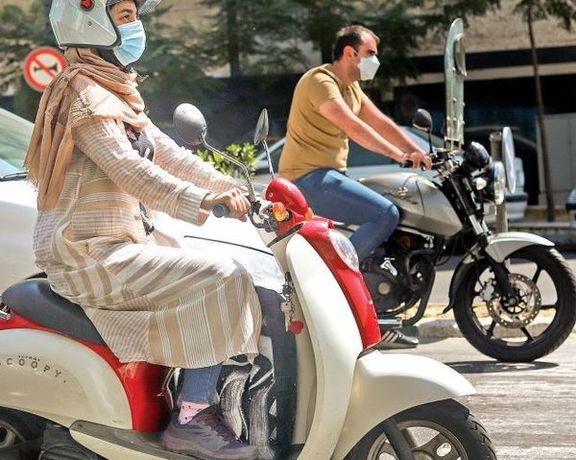
A video on social media shows government security forces in Iran clashing with and detaining a male motorcyclist who was giving a ride to a woman without hijab.
The video shows how law enforcement personnel confiscate a motorcycle from the man, while citizens attempt to thwart their efforts.
In response to the video, a social media user remarked, "It seems like you radical extremists have decided to engage in a full-scale civil war with the great Iranian nation. Be aware that you will face heavy consequences for this, so brace yourselves for the steep toll you will pay."
These events unfold less than a month prior to the anniversary of the tragic killing of Mahsa Amini by hijab police last September, as the regime takes up measures to forestall nationwide anti-regime protests.
In recent months, an increasing number of Iranian women have taken to riding motorbikes on the streets and highways, following the Woman, Life, Freedom protest movement that erupted in September 2022. Riding motorcycles, along with ditching the hijab, has become a courageous act emblematic of the civil rights struggle by women.
Prior to the 1979 revolution that ushered in the Islamic regime in Iran, women were permitted to ride motorcycles. However, in the subsequent years, along with forced hijab, riding motorcycles and even bicycles became restricted.
Nonetheless, numerous Iranian lawyers and activists contend that since Iranian women are permitted to ride motorcycles as passengers, there is no rationale for barring them from being drivers.
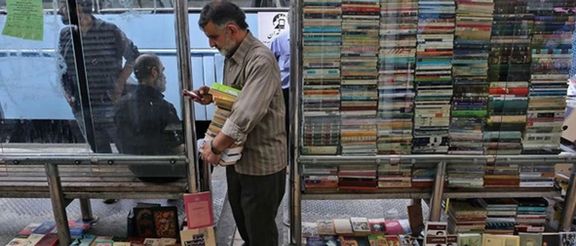
The Ministry of Culture in Iran has come under criticism for censoring a sentence indirectly critical of Russia in the translation of a psychology book.
The sentence in question, "Putin's bombing of Ukraine," was allegedly censored, shedding light on a wider discussion about regime influence on literary and scientific content.
Asadollah Amrayi, a famous translator and journalist, revealed the alarming development, stating that the ministry has demanded the removal of the sentence related to Ukraine's from the translated book.
Taking to the social platform X (formerly known as Twitter), Amrayi expressed his astonishment: "Can you believe that in a motivational psychology book, the Culture Ministry has demanded the removal of [such a sentence?]” The incident has sparked conversations on social media, with some interpreting the ministry’s actions as a reflection of a "Russophile" stance, hinting at a government bias towards Russia.
Interestingly, the media landscape in Iran presents a skewed view of Russia's invasion of Ukraine, often favoring Moscow's perspective. This episode has also given rise to comparisons with George Orwell's dystopian novel 1984, with some users likening the Ministry of Culture to the infamous Ministry of Truth. This fictional institution altered historical events to suit the regime's narrative.
Censorship of books in Iran has a long history, but it has intensified under the influence of the Islamic Republic. In a recent report, Foreign Policy highlighted the mounting apprehension and control within cultural domains over the past two years. Various artistic fields have been hampered by the conservative policies of President Ebrahim Raisi's government, leading to challenges for independent artists working within an atmosphere of fear and restraint.

Iran's top Sunni cleric Mowlavi Abdolhamid has compared protests in Iran and Israel, noting that Prime Minister Benjamin Netanyahu did not kill any protesters.
Abdolhamid, who has emerged as an outspoken critic of the regime in the past year, made the remarks during his Friday prayer sermons, referring to large-scale protests underway in Israel since early 2023 in response to the ruling government's push for a wide-ranging judicial overhaul.
In Israel, 123 protesters were injured and about 700 people were arrested since January. In Iran, well over 500 protesters were killed by regime’s agents while the number of the injured – including those who lost eyesight – is so high that cannot be estimated. At least 22,000 were arrested, with seven executed and some on death row on trumped up charges.
Comparing how the Israeli government is handling the protests with what the Islamic Republic is doing, he said, "It's astonishing that in Israel, not even one person from the protesters and forces opposing the government has been killed. Israel kills Palestinians but not its own people. They differentiate between their own nation and others. But why isn't it the same here?"
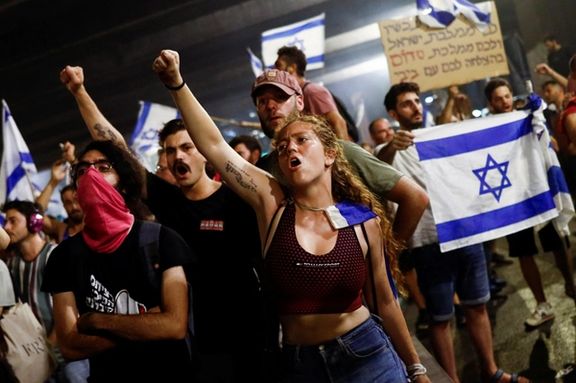
Abdolhamid said, "Everyone in Israel has revolted and protested that Netanyahu wants to lead the government towards dictatorship. Pilots and reserve army forces have resigned because they don't want to defend a dictatorship,” implicitly calling on Iranian military officials to break their silence in the face of injustices.
The cleric rebuked the authorities who continue to threaten people to discourage them from further demonstrations as the anniversary of anti-regime protests approaches in mid-September, and the regime has intensified its intimidation campaign. "Recently, one of the Basij commanders said that if there is another protest, we will suppress it. Suppressing the people is not the right approach. The Basij should listen to the people's grievances.People have problems; they are hungry; they are humiliated and are stuck in a deadlock.”
He condemned those officials who are not independent in their decisions and turn a blind eye to the country’s problems and corruption, emphasizing that there are no prospects for a better future for Iran. Referring to the inability of the government to deal with Iran's critical issues, he said, "Day by day, the country's crises deepen, and the nation is facing endless problems. Now, with the arrival of a new parliament and administration, are these problems supposed to be resolved," Abdolhamid said referring to parliamentary elections in March.
"If there is no bright prospect and the new parliament will only repeat the same old tactics, while people's vote would have no impact, it will be all futile," he added.
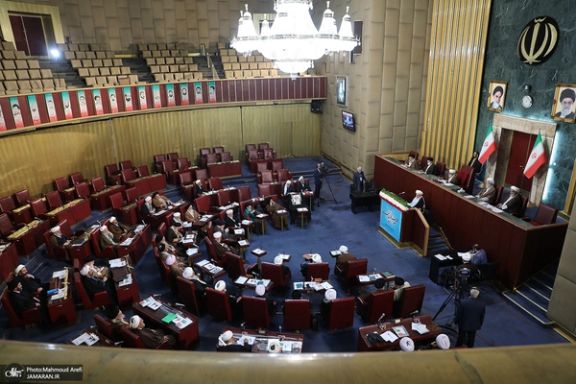
Implicitly alluding to Iran's leader Ali Khamenei, he emphasized the necessity for all individuals, regardless of their status, to be subject to accountability without being treated as untouchable "red lines." He labeled this issue as the regime's "greatest danger," condemning the reluctance of senior officials to heed the grievances of the people, especially those whose identities remain concealed from public discourse. Critically assessing the Assembly of Experts for Leadership—an authoritative body responsible for appointing the Supreme Leader—Abdolhamid asked, “What is the purpose of this council if its members cannot oversee the organizations and institutions under Khamenei’s control?”
The forthright Sunni leader remarked that unless there is a shift in perspectives and policies, coupled with substantial transformation that genuinely serves the people, the ongoing challenges will endure. He stressed that merely altering parliamentary representatives, the Assembly of Experts, or the presidency will not suffice to address these persistent issues.
Following his sermons, people in several Sunni majority cities in Sistan-Baluchestan, including the provincial capital Zahedan, poured onto streets and chanted slogans to demand the release of political prisoners. Residents have been protesting every Friday since last September when sucurity forces killed around 90 civilians during a Friday protest.






